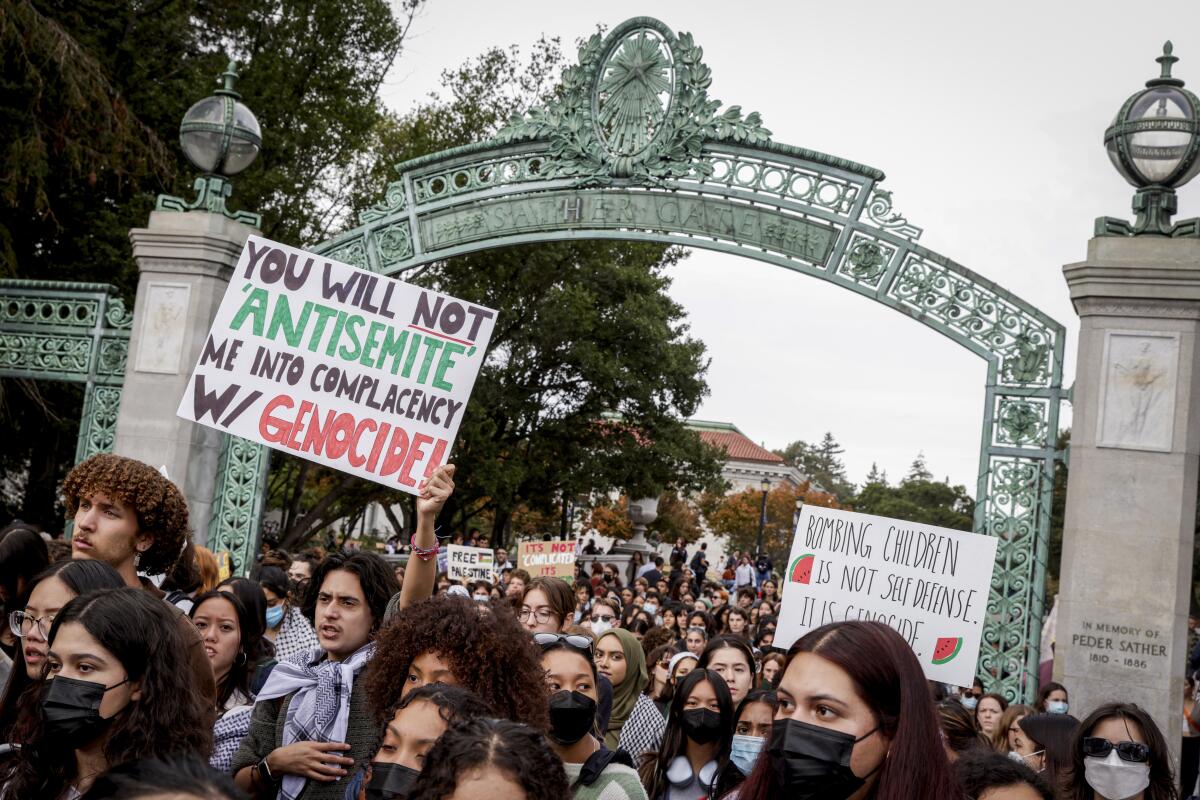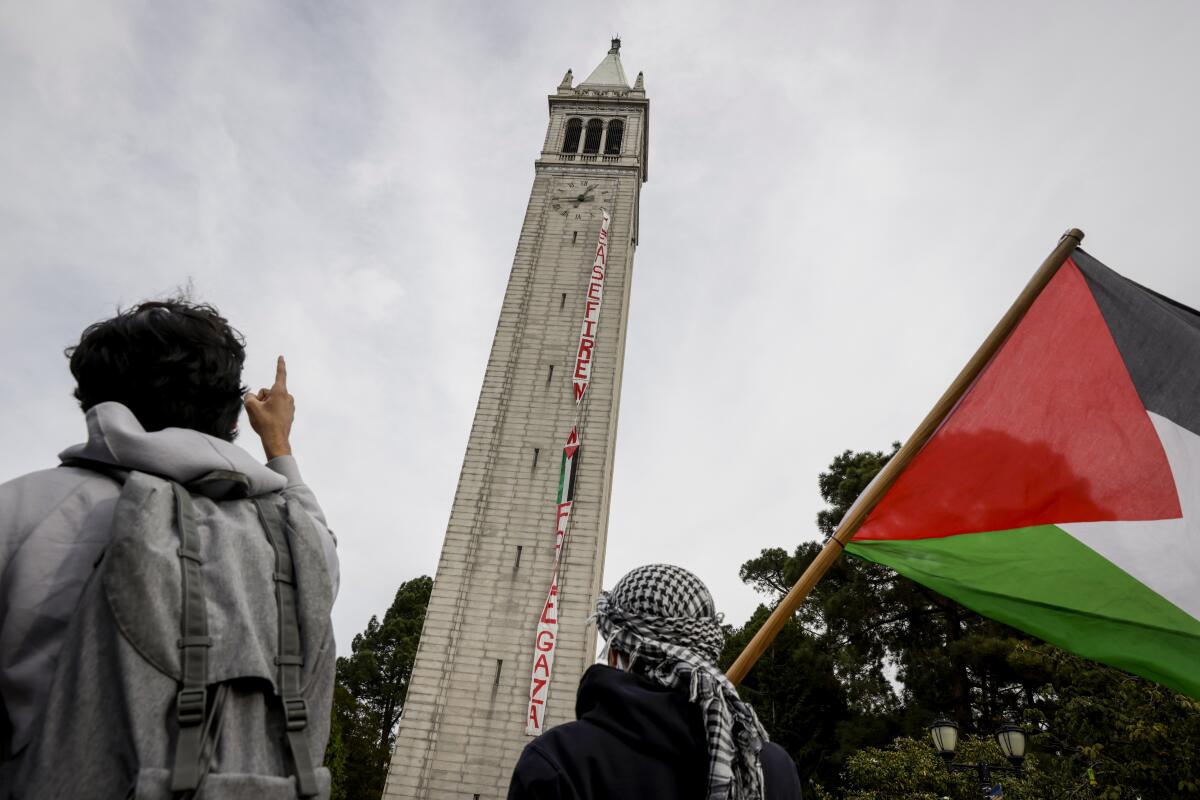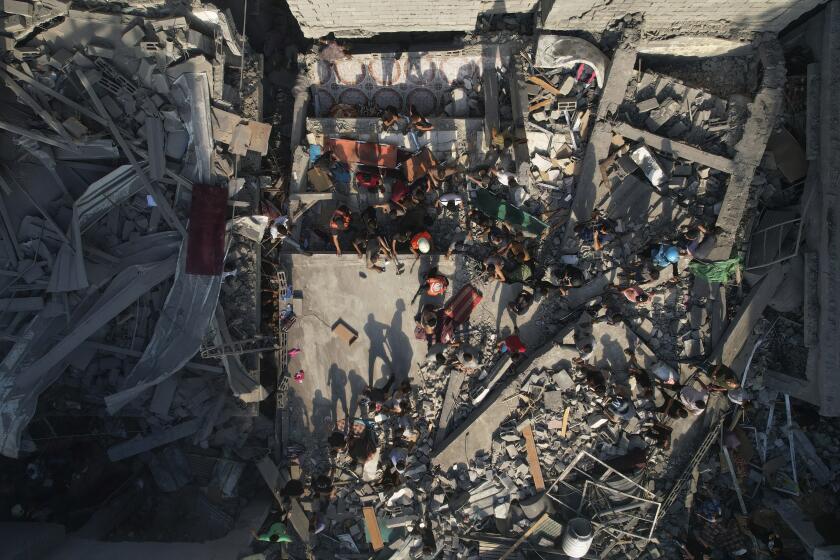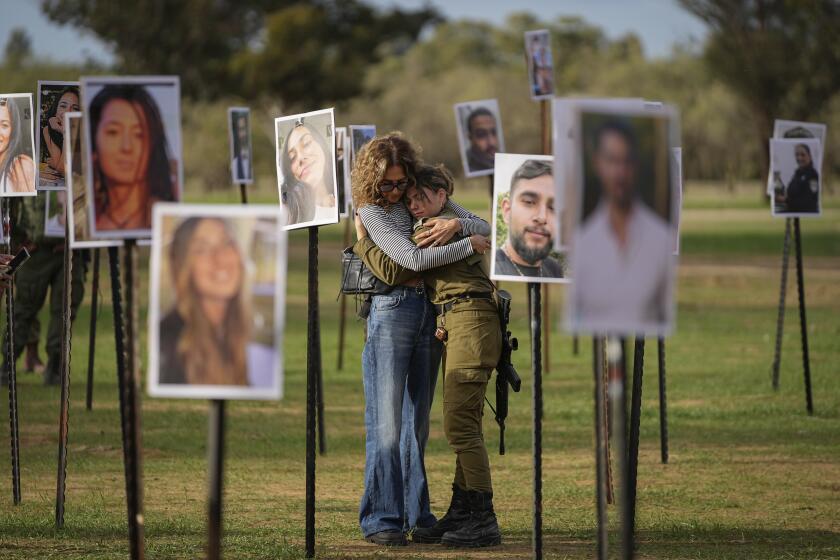Lawsuit accuses UC Berkeley of fostering antisemitism. Dean calls accusations ‘stunningly inaccurate’

- Share via
UC Berkeley is being sued by Jewish groups claiming that the university has fostered a “longstanding, unchecked spread of anti-Semitism” on campus — an accusation that university officials say paints a distorted and inaccurate picture of the school.
Filed Tuesday by the Brandeis Center and Jewish Americans for Fairness in Education, the complaint alleges Berkeley Law, the university law school, has “failed to confront, much less combat” antisemitism and that policies adopted by some student organizations discriminate against Jewish students. The lawsuit also alleges students have faced violence and harassment since Oct. 7, when Hamas launched an attack in Israel, killing about 1,200 people.
“The University has enabled the normalization of anti-Jewish hatred on campus,” the complaint, filed in federal court in San Francisco, reads. “Jewish students feel compelled to hide their identities.”
But university officials refuted many of the claims, and said the allegations made in the 37-page complaint don’t reflect “the facts of what is actually happening on campus.”
Tensions have been high at the campus following the Oct. 7 attack, sparking ongoing and, at times, opposing protests occurring at the same time. But UC Berkeley officials say they’ve been reaching out to student groups, offering counseling support, and making other arrangements to protect free speech and support students on campus.

“UC Berkeley believes the claims made in the lawsuit are not consistent with the First Amendment of the Constitution, or with the facts of what is actually happening on our campus,” Dan Mogulof, spokesperson for the university, said in a statement. “The university has long been committed to confronting antisemitism, and to supporting the needs and interests of its Jewish students, faculty and staff.”
The lawsuit claims that, following the Oct. 7 attack and the ongoing protests on campus, Jewish students have been targets of harassment and physical violence, and that Jewish students have received hate emails calling for their gassing and murder.
“Jewish students have reported being afraid to go to class, which would require them to pass through the pro-Hamas rallies taking place in Berkeley’s main thoroughfares,” the suit reads.
The suit also alleges that several student groups, including those that represent women, Asian and LGBTQ+ law school students, have adopted policies that discriminate and exclude Jewish students, including those that call for divestment and sanctions against the state of Israel or require that speakers repudiate Zionism before being invited to speak. Representatives for some student groups could not be reached for comment.
Berkeley Law School Dean Erwin Chemerinsky, refuted the claims.
“The complaint filed by the Brandeis Center paints a picture of the Law School that is stunningly inaccurate and that ignores the First Amendment,” Chemerinsky said. “For example, student organizations have the First Amendment right to choose their speakers, including based on their viewpoint. Although there is much that the campus can and does do to create an inclusive environment, it cannot stop speech even if it is offensive.”
The U.S. must stand firmly behind Israel but caution our ally against overreacting against Gaza’s civilians to the grotesque Oct. 7 Hamas attack.
Mogulof, spokesperson for the university, said some of the claims made in the complaint “have no basis in fact.” Despite the claims of possible discrimination in the lawsuit, he said the university was not aware of any incident where a student was excluded from a student organization based on their Jewish identity.
He said university officials have found no incidents where students reported getting the kind of emails that were described in the complaint.
“This is the first anyone has heard of an allegation of that sort,” he said. “I can assure you that if we have — or if we do — we will respond strongly and quickly.”
School police have also received one incident of alleged violence that occurred on Oct. 25, he said, involving two people who tried to take an Israeli flag from a student during a rally for Palestine. When they were unable to take the flag, the suspects hit the student in the head with his own metal water bottle.
Police are still pursuing leads in the incident, and school officials have reached out to the student.
“The university is taking this very seriously, and the student has been offered support,” Mogulof said.
For some, the university’s actions have not been enough.
“I don’t want to see students physically assaulted and the university not be willing to investigate it as a hate crime,” said Hannah Schlacter, a student at UC Berkeley’s Haas School of Business.
Palestinian Americans with Gaza connections struggle with feelings of helplessness over violence after Hamas’ attack and Israel’s retaliation.
Schlacter, who said she’s been helping lead the campus’ Jewish student community, is also a member of Jewish Americans for Fairness in Education, one of the plaintiffs in the suit. Although not named, she said she provided testimony for the suit.
She said she was concerned university officials did not refer to the Oct. 25 incident as a hate crime. She said another incident on Oct. 16, where two people wearing masks tried to yank away an Israeli flag from a Jewish student wearing the flag as a cape, was also not being investigated as a hate crime.
“The university happens to not be following the policy in place to respond to these issues,” she said. “The fact of the matter is that the university is not investigating that as a hate crime and that to me is concerning.”
She said Jewish students are also concerned about what she called “indoctrination” by professors, including an incident where a graduate student offered extra credit for students who attended a pro-Palestine demonstration.
After school officials heard concerns, the options for extra credit for the class studying the Middle East were expanded to include any local event that involved the topic, including protests or documentaries.
The lawsuit comes as protests have erupted in universities and city streets across the country following the Oct. 7 attack by Hamas and the ongoing military actions of Israel in Gaza.
As the Palestinian militant group Hamas frees more hostages amid a temporary truce with Israel, a harrowing glimpse of captivity in war-torn Gaza emerges.
Some supporters of Israel have called on university leaders to better police pro-Palestinian rallies, while supporters of Palestine have also accused some campus leaders of issuing statements that condemn violent attacks by Hamas, but don’t criticize Israel’s military actions in Gaza.
In a statement to UC Berkeley students and staff on Nov. 3, Chancellor Carol Christ said she was concerned about an alarming increase of “antisemitic expression” in the country and campus.
“Our university condemns antisemitic expression in its very form, and we are committed to addressing it when it occurs and responding when it is reported,” she wrote.
Palestinian students and supporters have also faced harassment, threats and doxxing, she said, and urged students to report any incident to the Office for Prevention of Harassment and Discrimination.
About 300 UC Berkeley faculty have also signed on to a letter condemning the Oct. 7 attack. Some students on campus had referred to the attacks as “resistance” and part of a “freedom struggle,” which signatories of the letter call “repugnant and indefensible.”
Among those who signed the letter were Christ and Chemerinsky.
More to Read
Sign up for Essential California
The most important California stories and recommendations in your inbox every morning.
You may occasionally receive promotional content from the Los Angeles Times.














